Colin Baker: Re-trial of a Time Lord
Guest contributor Andrew Rigby on where he thinks the Sixth Doctor era went wrong.
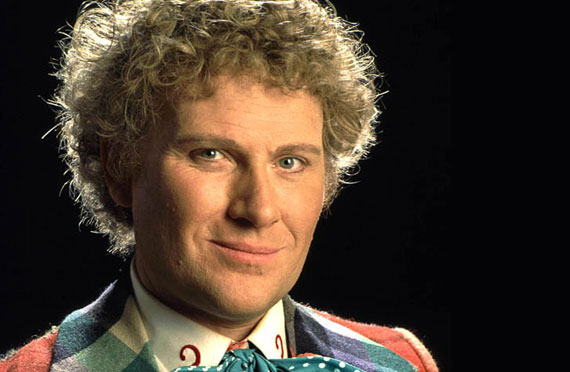
It is interesting to read the wide array of opinions out there about Colin Baker’s time as the Doctor. Everything from apologists determined to see only the positives of this era, to those who condemn it for its cynicism and violence, to those whose personal taste simply means they like it more than the overage Doctor Who fan. On the whole, though, the overwhelming weight of opinion is negative: from the consistently low rankings of stories from this era in most polls (with the highest rated story coming in only at 70 in the 2014 DWM poll), to the lowest placing of the 6th Doctor himself compared to the other ‘main’ Doctors. There’s arguably not much more to say. Except there is one recurring trend that I keep noticing, regardless of most people’s spin on this particular era, and which I would like to challenge: the idea that it wasn’t Colin Baker’s fault.
I have always happily bought into this idea until recently. After all, Colin Baker seems a decent enough chap and has remained fiercely loyal to the show despite his unceremonious sacking. Also, of course, the scripts, production values, direction and overall sensibility of the show was notably well below par at this point – so it’s hard to not feel some degree of empathy for any actor working in this context. Sci-fi television is full of actors who repeatedly rise above the quality of some of the more mediocre scripts they are given to contend with throughout their time and manage to give powerful, lasting and often dignified performances: from Patrick Stewart, to Gareth Thomas, to the great Tom Baker. Unfortunately, I do not believe Colin Baker to be one of them.
With respect to those fans who get so much enjoyment out of this era of the show, my own view is that it is not simply the case that Colin Baker was let down by the hand he was dealt. He was actually part of the problem. He simply wasn’t a good enough actor. His performance as the Doctor did nothing to elevate the already weak material, and in fact only compounded those weaknesses.
 The Twin Dilemma is a fine case in point. You might argue it is an unfair exemplification. This story seems to be universally loathed on every level, but that cannot diminish the responsibility he had as the lead actor of the show. It was his Doctor’s first story, and therefore there was always going to be much at stake in relation to how he chose to portray the character. Baker’s choices here would prove to have a profound impact on the viewing public’s future investment (or lack thereof) in Doctor Who, particularly given how long they would then have to wait for Baker’s next story and first full season as the Doctor. Needless to say, there was a great weight of responsibility on the choices he would make – and it was a complete disaster.
The Twin Dilemma is a fine case in point. You might argue it is an unfair exemplification. This story seems to be universally loathed on every level, but that cannot diminish the responsibility he had as the lead actor of the show. It was his Doctor’s first story, and therefore there was always going to be much at stake in relation to how he chose to portray the character. Baker’s choices here would prove to have a profound impact on the viewing public’s future investment (or lack thereof) in Doctor Who, particularly given how long they would then have to wait for Baker’s next story and first full season as the Doctor. Needless to say, there was a great weight of responsibility on the choices he would make – and it was a complete disaster.
His wild gesticulations as he mourned the “grinding engines of the universe”, his complete lack of either irony or inner-struggle (anything will do) whilst informing Peri his intentions toward hermitude, the cowardly way he hides beneath Perry’s arm like a pantomime dame. These were not only bad script choices in the hands of a director who didn’t care enough to offer much direction – they also were choices made by this actor at this time. Baker does nothing to convince me that the Doctor is experiencing a post-regenerative crisis through his portrayal of the character.
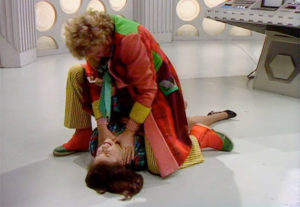 His performance does not communicate instability, it communicates obnoxiousness. This is not someone that motivates me to know more by hinting at depth and mystery; and it is not someone that I particularly want to invest in and watch on a weekly basis. In addition, Baker does nothing to ease the uncomfortable notion that the Doctor’s treatment of Peri is basically abusive, making it wildly implausible that the she would actually be particularly motivated to continue travelling with him. The lack of sub-text is not only due to the weaknesses of the script but because Baker does not allow there to be a sub-text. He plays everything like a 9-year-old showing off his very best line readings at an audition for drama school.
His performance does not communicate instability, it communicates obnoxiousness. This is not someone that motivates me to know more by hinting at depth and mystery; and it is not someone that I particularly want to invest in and watch on a weekly basis. In addition, Baker does nothing to ease the uncomfortable notion that the Doctor’s treatment of Peri is basically abusive, making it wildly implausible that the she would actually be particularly motivated to continue travelling with him. The lack of sub-text is not only due to the weaknesses of the script but because Baker does not allow there to be a sub-text. He plays everything like a 9-year-old showing off his very best line readings at an audition for drama school.
Sadly, this set the template for much that was to follow. The idea of a morally ambiguous lead character exploring an increasingly dark, nihilistic and uncomfortable universe is a daring and interesting path for the show to take – but not one which is served by the man wearing a garish technicolor dreamcoat (and yes, I know that was not Baker’s choice, but oddly it is a much closer match to his acting style than an Eccleston style leather jacket would have been).
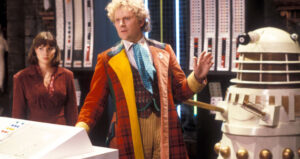 Revelation of the Daleks is my favourite story from the era. I actually think it’s rather good – a literate script, very well directed, and there’s something reassuring about matching a Doctor that it’s so hard to get a handle on against his oldest enemy. For the most part, I also think this is by far Colin Baker’s best performance, yet it still falls well short of the mark when compared to the best work of most other actors to have played this role. Even given this much stronger production and the reduction of eye-rolling proclamation as the standard for every line reading, there is a persistent surface self-satisfaction about his performance which is never ambitious beyond the most obvious possible choices in how he handles the material. Part of the reason for this may be that his previous performances also have not particularly mined below the surface of the character. Rather than interesting hidden depths, up to now we have been given baffling self-righteousness. Therefore, Baker has not given himself a great many tools to play with in terms of communicating any kind of complexity which builds on what has come before.
Revelation of the Daleks is my favourite story from the era. I actually think it’s rather good – a literate script, very well directed, and there’s something reassuring about matching a Doctor that it’s so hard to get a handle on against his oldest enemy. For the most part, I also think this is by far Colin Baker’s best performance, yet it still falls well short of the mark when compared to the best work of most other actors to have played this role. Even given this much stronger production and the reduction of eye-rolling proclamation as the standard for every line reading, there is a persistent surface self-satisfaction about his performance which is never ambitious beyond the most obvious possible choices in how he handles the material. Part of the reason for this may be that his previous performances also have not particularly mined below the surface of the character. Rather than interesting hidden depths, up to now we have been given baffling self-righteousness. Therefore, Baker has not given himself a great many tools to play with in terms of communicating any kind of complexity which builds on what has come before.
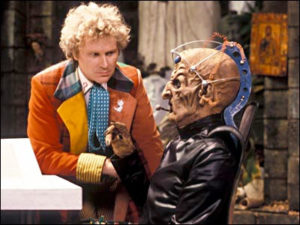 As a result of Baker’s acting style, some of the more powerful points in this episode, whilst perfectly fine, never quite reach the heights that might have been possible if this were a different Doctor. As he realises the nature of Davros’ evil schemes (“You’ve turned them into food? “But did you bother to tell anyone they might be eating their own relatives?”) the over-riding feeling that we get from Baker, who is at least admirably trying to be understated in his performance, is a sense of perturbed disagreement, rather than a powerful sense of moral disgust (or something equally interesting). Upon reflecting on the possibility of his death toward the end of the first episode, Baker takes on a meditative visage that works quite well in context, but there is none of the conflicted depth of feeling or multi-layered sensibility that the likes of Matt Smith could summon up in only a few seconds of hearing the word ‘Trenzalore’. It’s all so….. surface and simple.
As a result of Baker’s acting style, some of the more powerful points in this episode, whilst perfectly fine, never quite reach the heights that might have been possible if this were a different Doctor. As he realises the nature of Davros’ evil schemes (“You’ve turned them into food? “But did you bother to tell anyone they might be eating their own relatives?”) the over-riding feeling that we get from Baker, who is at least admirably trying to be understated in his performance, is a sense of perturbed disagreement, rather than a powerful sense of moral disgust (or something equally interesting). Upon reflecting on the possibility of his death toward the end of the first episode, Baker takes on a meditative visage that works quite well in context, but there is none of the conflicted depth of feeling or multi-layered sensibility that the likes of Matt Smith could summon up in only a few seconds of hearing the word ‘Trenzalore’. It’s all so….. surface and simple.
Bringing this more up to date, there is a clip floating around on Youtube of Colin Baker delivering the speech from The Rings of Akhaten. Despite all of the praise given in the comments section for Baker’s reading (perhaps emphasising the subjectivity of this article), it really doesn’t work for me and continues to demonstrate the problem I always had with Baker’s performances. Baker’s reading is once again without an ounce of depth or texture. The choices made are all very obvious. Much like his Doctor’s endless speeches in Trial of a Time Lord, it’s all surface bombast, wide-eyed posturing and amateur dramatic exclamation marks.
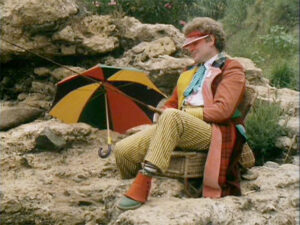 Undoubtedly, the wonderful thing about fandom is the extent to which such greatly conflicting views can exist within the context of a basic love for the show. So to all those who love Colin Baker and this era of the show – great! I can only be glad that it works for you. And to those who are full of praise for his work on the various audio adventures, I haven’t heard any of those so I am not in a position to comment.
Undoubtedly, the wonderful thing about fandom is the extent to which such greatly conflicting views can exist within the context of a basic love for the show. So to all those who love Colin Baker and this era of the show – great! I can only be glad that it works for you. And to those who are full of praise for his work on the various audio adventures, I haven’t heard any of those so I am not in a position to comment.
But my own view, for what it is worth, is that despite the very best and most honourable of intentions, Colin Baker’s limitations as an actor during his time on the show was actually damaging and made an already bad situation worse. Of course, what’s done is done – and I can manage find things to like in a couple of stories from that era. However, despite my desire to enjoy the nostalgia of the stories which populated my childhood, now that I look back with a more analytical eye, I also find myself unable to simply dismiss the reasons as to why the show lost its appeal if only for a few years around that time.








